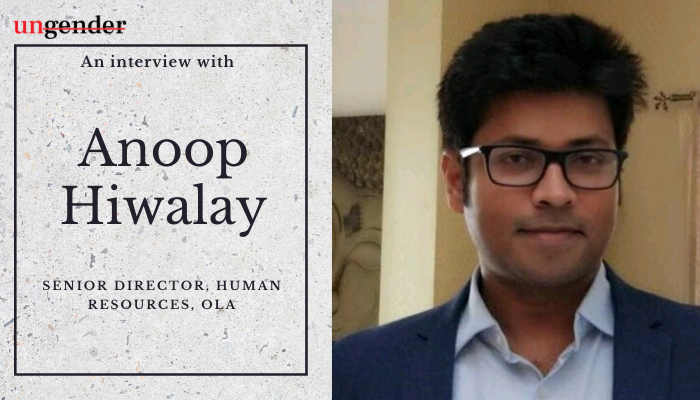Our Business Has Been Hit But We Are Also Seeing Recovery, Says Anoop Hiwalay, Senior Director of Human Resources At Ola Cabs

Note from the Editor: Ungender Insights will now feature an occasional longform feature from industry leaders or the blog team. This series is a new addition to the blog. We believe that longform content is important for our area of work and also relevant to readers who value insight on topics that are often complicated, nuanced and take time to grasp. While it is absolutely true that we are living in the instant-gratification age of short attention spans – we think it is important to sometimes present the “whole story”. We hope you enjoy these pieces.
This interview has been edited for longform text.
By Rituparna Chatterjee
One of the industries that has been hit the hardest in the Covid lockdown are cab ride aggregators due to the complete halt in domestic travel. As the lockdown gradually lifts, cab companies are trying to figure out new ways to incorporate technology into their functions and processes to adapt to new ways of work in a post-Covid world. In a conversation with Ungender Legal Advisory’s Director of Communication, Rituparna Chatterjee, Senior Director of Human Resources at Ola (ANI Technologies Pvt. Ltd), Anoop Hiwalay, talks about some of the changes that are in the offing at Ola and how the shared mobility space is likely to change.
****************
Q: We’ve now been close to four months post the lockdown enforced in March. Are we looking at a completely different work structure as companies gradually go back to normal? What will change for Ola?
A: A couple of things for a company like Ola, at this juncture become important, one of these is taking the time to reflect and pause and really see what changes for us? Everything essentially boils down to business. Clearly the shared mobility space will get impacted and already has. So for us, what changes mostly is how we will invest differently in the years to come. Our business has been hit but we are also seeing recovery. It will take time for the Indian market to recover but we will have to continue to invest and really see how Ola’s product portfolio changes. We launched a product called Pro, in the New Zealand market, which has done very well. It comes with all the elements of personal hygiene including sanitisers. So companies have to change their product offerings and product portfolio, that is number one.
Number two, I think companies have to become more tech enabled. Companies like Ola, thankfully, have a significant amount of folks in the technology and engineering fields. We do see us playing an important role in the future, the way we define our ways of working, and future of work. We see a lot of robotics and automation coming into picture. We (Ola) are one of the biggest Indian start-ups and substantial amounts of that success is due to our focus on tech and investments in technology.
I think tech is going to be the driver of making things possible for the driver and partner community in particular. If you are going to create workplaces that people want to come to – tech has a big role to play. In the new workplace I imagine that roles would evolve to be of three types roles which can and will be completely automated, semi-automated roles easily done from a distant workplace and thirdly potentially field-based roles for which we still have to ensure that people have actual physical workplaces.
Q: Given the fear, and especially since you’re in a business where proximity is of essence and yet the consequences of proximity could be very grim, what are you doing to rebuild trust to get people to travel again?
A: I think there is a general acceptance that we probably have to now live with the virus. There are a set of people for whom earning every day is critical to managing their livelihood. As an organisation, we have done a lot of things. But I think if there is general acceptance that we have to move on, people will move on. In fact, in providing the new ‘Pro’ category, we are ensuring that people understand that we are providing the sanitizers, a cleaner car, and we are ensuring that the driver partners are very well trained to handle that situation.
So, how do we educate our drivers and the customers both? I think we are just trying to emphasise the fact that there are two things which are critical here, the responsibility of driver partners, but is also the responsibility of the customers to manage the situation.
I think we are going to continue to work on the app and give you real time understanding of things like who was the last traveller in the car, so that you can make an informed decision. Education of the driver partner again is very important, how do you keep connecting with them? As an organisation, how do we reach out and ensure that the community understands that the organisation is standing with them through this time?
Q: How is Ola incorporating diversity when it comes to talent acquisition. We feel people understand diversity and inclusion in very different ways. It is a many layered thing. What is Ola’s philosophy about this?
A: We are a 9-10 years old organisation, and at a nascent stage in our diversity evolution. We are still building our philosophy on diversity. If I had to look at diversity, for say, multinational companies, they break it down to people with disabilities, or gender. But if you start looking at a diversity element specifically in India, it can be so many things. It can be so many things like region, caste.
I think our philosophy is how do you enable the workplace for everybody? That’s critical. Have we made dedicated efforts to be inclusive? Yes of course, we have done that. In fact, one of the very senior people in our Ola mobility Institute is a person living with a disability.
Q: Do you have trans employees? Or a set policy for hiring of trans employees?
A: We don’t have a policy as of now. In a very young organisation like ours, for example, when we go for interviews, there are no filters. Now the problem is sometimes there is no intentional thinking around diversity and that’s where the organisation’s intent is important, and for that to happen, you have to define your philosophy very clearly.
Our way of thinking about diversity is how do we, how do we enable everybody, how do we ensure that any employee, women or a transgender person or a person with disabilities, all have equal say in the organisation.
Q: What COVID has done is, it has locked women out of workplaces. Women’s mobility also of course depends on their financial independence. How do you think the low rates of women’s participation in the workforce will get impacted when things truly open up?
A: If companies are really serious about building new working models for the future, they now have an opportunity, now, to build a workplace out of homes. That gives them the opportunity to have women join the workplace in a part time, part sharing way. That’s a massive opportunity.
Research says there are hundreds of roles where women do better than men, whether it’s customer facing roles, and other things like that. I think there has to be a lot more advocacy to really think and ensure that there are jobs getting to people who actually have the talent to execute them. A new set of jobs which are emerging and I think that intent needs to be established within corporates.
Q: Are there policies specifically for women in Ola?
A: We have Ola’s Skilling University, where we give training to a lot of women drivers for driver partner roles. As part of Ola foundation we have focused on women’s education as well.
Q: As a cab aggregator company, there have been a lot of hiccups that Ola has faced in the safety space, especially because of proximity and cars as workplaces for women. What infrastructure, initiatives or policies does Ola have with respect to safety for women drivers and women customers?
A: If people are not going back to work, it will be doubly important for women to be in safe cars. Given that offices will not be as popular, it’ll be doubly important for women to have a safe pick up and drop and same goes for women drivers. We’ve had the Guardian app which helps you in case of an emergency. A lot of safety centered innovation will have to be tech-led.
Q: What are your thoughts on inclusion as a measurable element for a company’s culture and its cultural health? How should organisations go about capturing inclusion in culture?
A: We need to first identify what the biases are before we go to measurement. I think that’s the starting point. We as an organisation, are in the very early stages of this journey. Leaders need to be held accountable on how they demonstrate some of these actions. The truth is that “inclusion” is a term which is not very well understood by a large number of organisations, it is often relegated to a term that is considered only HR, not too many organisations understand how critical it is.
There has to be an industry wide thinking around what inclusion is important and what is the business case for inclusion. Culture and engagement forms the business context. Diversity and inclusion are continued to be seen as issues separate from the business and this is not really true. Elements of diversity and inclusion that are visible in India need to be integrated in our daily ways of working.
Q: Do you think there is enough focus on training, knowledge and skill upgrades of HR professionals within the organisation?
A: There are companies like HSBC where training is a mandatory thing, you have to go through training programmes, because you have to answer regulators. But I’ve seen the training evolve. Training is becoming self-service, as an employee you get a bouquet of offerings and you go and pick what you need. For example – I don’t necessarily have to go through the training programme, which my manager decides for me. I can just go and read an article or do a course that’s learning for me. Training again has to evolve and not be a classroom thing.
In new age companies and some start-ups you’re responsible for your own growth, you get it done, you move on. People who are passionate, interested, will latch on to it and make good use of it, and they’ll move on. There are a set of people who will not use it.
Q: As an HR leader, what is your biggest challenge in the Indian setup vis-à-vis hiring?
A: I do two roles – I head the talent acquisition for the large group companies and also head the HR for a product and technology cum engineering organisation. I think gender diversity in technology continues to be a challenge. That is something that the industry has to solve. But how do you start? How do you ensure that there is gender diversity and that there are women at engineering colleges? That needs intervention from the government.
One of the biggest challenges that we continue to face specifically in the gender diversity area is finding the women talent in STEM. I haven’t seen a concerted focus offered by the industry, bodies, governments or even the corporates at the source of some of the institutions to really bring in the talent. You rarely see women leaders in engineering organisations.
About the author: Rituparna Chatterjee is a journalist with close to two decades of experience in journalism, working across media platforms, and tracking ground-up stories of feminist movements, social inequalities, gaps in gender discourse, and communities. She currently oversees communications for Ungender Legal Advisory
This article has been 🖊 edited by Varna
Ungender Insights is the product of our learning from advisory work at Ungender. Our team specializes in advising workplaces on workplace diversity and inclusion. Write to us at contact@ungender.in to understand how we can partner with your organization to build a more inclusive workplace.
Read our insights about diversity, legal updates and industry knowledge on workplace inclusion at Ungender Insights. Visit our Blog.
Sign up to stay up-to-date with our free e-mail newsletter.
The above insights are a product of our learning from our advisory work at Ungender. Our Team specialises in advising workplaces on gender centric laws.
or email us at contact@ungender.in




